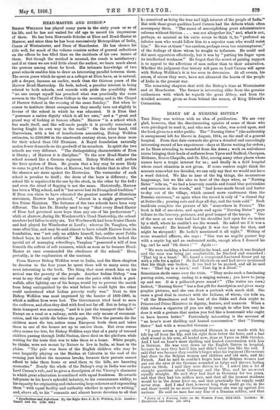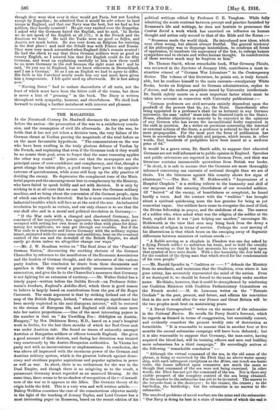DIARY OF A NURSING SISTER.• Tars Diary was written with
no idea of publication. We are very glad, however, that the discriminating opinion of some of those who were privileged to read it, and who saw its value, was acted upon, and the book given to a wider public. The " Nursing Sister " (the authorship is anonymous) left for Havre in August, 1914, on the staff of a general hospital. From that date onwards she gives a detailed and exceedingly interesting record of her experiences—days at Havre waiting for orders ; at Le Mans attending to wounded from the Aisne ; work on ambulance trains bringing their loads of sufferers from Ypres and Bailleul, Chocques, B6thune, Neuve Chapelle, and St. Eloi, among many other places whose names have a tragic interest for us ; and finally in a field hospital whose exact situation is not given. If some readers might think the account somewhat too detailed, we can only say that we would not have a word deleted. We like to hear of the big things, the momentous happenings, but we like also to hear of the days when, as " Nursing Sister " tells us, " we had a heavenly ramble and found blue periwinkles and anemones in the woods," and " had home-made bread and butter to-day out of the village, which caused more excitement than the Russian successes," or again when the record is only of " a dismal day at Sotteville ; pouring cats and dogs all day, and the train cold." Such incidents complete the picture of life " somewhere in France." The book is full of anecdote, and again and again " Nursing Sister " pays tribute to the bravery, patience, and good tempef of the troops. " Ono of the men on our train had had his shoulder laid open for six inches by a shell, where he couldn't see the wound. He asked me if it was a bullet wound f He himself thought it was too large for that, and might be shrapnel 1 He hadn't mentioned it all night." Writing of some wounded officers, she says : " One was an angelic gunner boy with a septic leg and an undaunted smile, except when I dressed his leg, and he said Oh damn I ' " Again :— " We were tackling a bad wound in the head, and when it was finished and the man was being gob comfortable, he flinched and remarked : ' That to is a beast.' We found a compound-fractured femur put up with a rifle for a splint ! He had blankets on and had never mentioned that his thigh was broken. It too had to be packed, and all he said was : That leg is a boast,' and That leg is a Beast.' " Sometimes shells came over the train. " They make such a fascinating purring noise, coming, ending in a singing scream ; you have to jump up and see. It is a yellowish-green sound " (The italics are ours.) Indeed, " Nursing Sister " has a fine gift for description and gives many graphic pictures, and she can draw a portrait with much skill. She came a good deal in contact with the Indians, of whom, she tells 114 " all the Museuhnans and the beat of the Sikhs and Jets might be Princes and Prime Ministers in dignity, feature, and manners. When a Sikh refuses a cigarette (if you are silly enough to offer him one) he does it with a gesture that makes you feel like a housemaid who ought to have known better." Particularly interesting is the account of " an hour's most thrilling and heated conversation " that " Nursing Sister " had with a wounded German :- " I came across a young educated German in my wards with his left leg off from the hip, and his right from below the knee, and a bad shell wound in his arm, all healed now, done at Ypres on 24th October. And I had an hour's most thrilling and heated conversation with him in German. He was very down on the English Sisters in hospital, because he says they hated him and didn't treat him like the rest. said that was because they couldn't forget what his regiment (Bavarians) had done to the Belgian women and children and old men, and the French. And he said he couldn't forget how the Belgian women had put out the eyes of the German wounded at Liege and thrown boiling water on them. I said they were driven to it. I asked him a lot el straight questions about Germany and the War, and he answered equally straight. He said they had food in Germany for ten years, and that they had ten million men, and that all the present students would be in the Army later on, and that practically the supply could never stop. And I said that however long they could go on, in the end there would be no more Germany because she was up against five nations. He said no man has any fear of a Russian soldier, and that • Diary of a Nursing Sister on the Western Front, 1914-1915. London, W. Blackwood and Sons. 155. net.] though they were slow over it they would get Paris, but not London except by Zeppelins ; he admitted that it would be sehr schwer to land troops in England, and that our Navy was the beat, but we had so few soldiers, they hardly counted I He got very excited over the Zeppelins. I asked why the Germans hated the English, and he said, ' In Berlin we do not speak of the English at all (!!!) ; it is the French and the Russians we hate.' He said the Turks were no good zu helfen, and Austria not much better. He was very down on Belgium for resisting in the first place ! and said the Schuld was with France and Russia. They were very much astonished when England didn't remain neutral ! He had the cheek to say that three German soldiers were as good as twenty English, so I assured him that five English could do for fifty Germans, and went on explaining carefully to him how there could be no more Germany in the end because the right must win ! and he said, So you say in England, but we know otherwise in Deutschland, and I am a German.' So as I am an English we had to agree to differ. His faith in his Valerkind nearly made him cry and must have given him a temperature. I felt quite used up afterwards. He is fast asleep now."
" Nursing Sister " had to endure discomforts of all sorts, not the least of which must have been the bitter cold of the trains, but there is never a hint of " grousing " in the book. The Diary is written throughout with sympathy, humour, and cheerfulness. We shall look forward to reading a further instalment with interest and pleasure.































 Previous page
Previous page